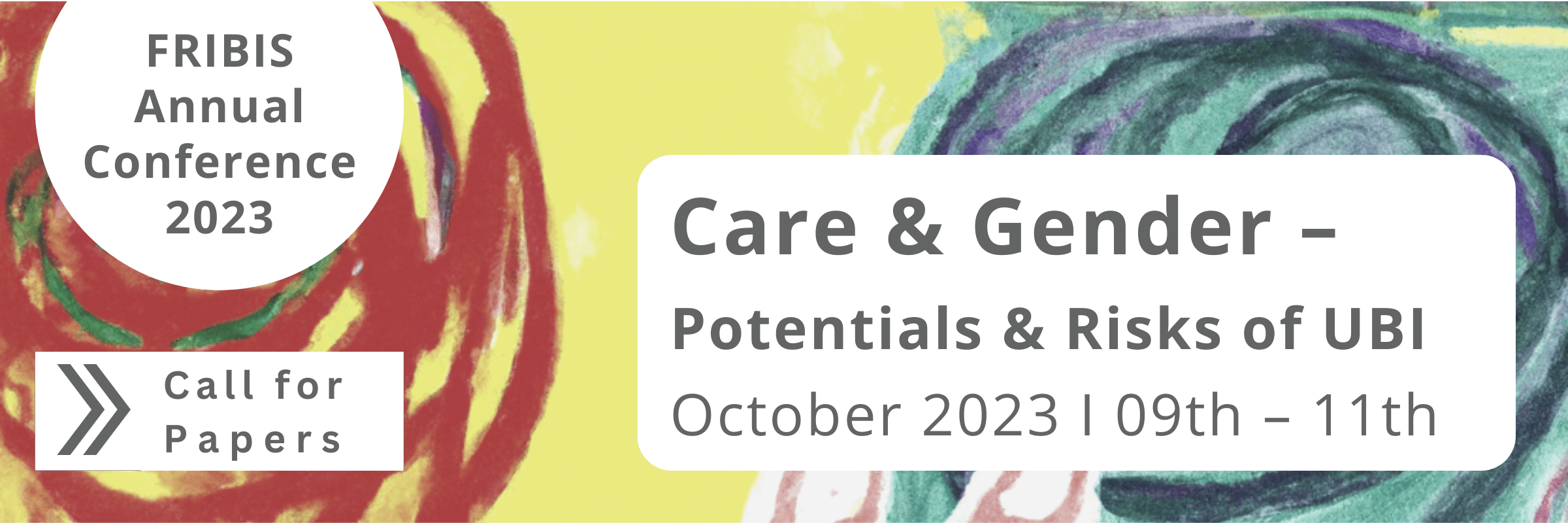
Call for Papers
Call for Workshops
Call for Posters
Deadline: 30/06/2023
Helpdesk:
conference@fribis.uni-freiburg.de
Care & Gender – Potentials & Risks of UBI
The FRIBIS Annual Conference 2023 from Oct. 09 – Oct. 11 will focus on Care & Gender as fundamental dimensions of human societies. It is dedicated to research, approaches and the possible interactions of care & gender in context of the Unconditional Basic Income (UBI). Although care and gender have many intersections, they have unique characteristics and specificities that necessitate separate consideration. Therefore, FRIBIS welcomes contributions which address the theme of care and gender separately or in tandem.
Care: Potentials & Risks of UBI
Care, the diversity of formal and informal care activities, represents the micro-, meso- and macrosystemic prerequisite, condition and foundation for any functioning human society and its economic systems. Despite the universality of care and its fundamental importance, care is largely marginalised in the public debate, although it is characterised by shortages and gaps in provision (“care gaps”). What potentials and risks does a UBI have for care? And what role does care play in the basic income debate? Thematic suggestions may include:
- What personal circumstances and institutional frameworks would make it possible to close gaps in care and provision and to shape care in the future? What role can a UBI play in this?
- What role can care, gender and basic income discourses play in socio-ecological transformations?
Gender: Potentials & Risks of UBI
When we seek ideas and models of a UBI through a feminist lens, we address the perspectives of all those who are socially disadvantaged and who may not fulfil the predetermined role assigned to them in an androcentric economy and society. The aim is to discuss basic income from a gendered position while considering other, compounding forms of oppression based on social identity, i.e. class, race, disability, sexual orientation.
While there are already debates on the Unconditional Basic Income in feminist literature, which are mainly concerned with the question of whether it liberates women or constricts them to doing more unpaid care work, feminist voices are still underrepresented in the UBI discourse. Discourses on UBI and gender equity are not only intertwined, they are interwoven in a common notion of life lived without poverty and in real freedom. Accordingly, the designing and reorganisation of society through the introduction of a UBI must include feminist, economic and political thinking. Thematic suggestions may include:
- How do production and reproduction relate to each other? How would a UBI affect or change this relationship?
- To what extent are economic/social theory and UBI male-dominated discourses? Whose perspectives and which aspects are currently neglected in the UBI debate, and what contribution do they make to the discussion? How do they potentially change the UBI discourse?
Registration for the conference
We would be very pleased to welcome you at the FRIBIS Annual Conference. Registration will be possible soon and can be made through the event page on the FRIBIS website.
General information
FRIBIS is a university institute that brings together academics and civil society actors working on basic income in order to align bottom-up, social motives with top-down scientific expertise and promote them in political discourse. Accordingly, the FRIBIS annual conference addresses both target groups. The two-and-a-half-day event consists of a core conference section with keynote speakers, plenary sessions, core conference panels, and presentations by the respective core FRIBIS teams on a current and central topic of the basic income discussion, as well as an open conference section, which welcomes contributions outside of the central theme. Abstracts and full texts can be submitted for both sections. FRIBIS membership is not necessary.
Contributions from (early career) researchers and activists of all genders, locations and cultures are welcome. Abstracts and manuscripts for the open conference section can be submitted as individual papers, as organised sessions (workshop, roundtables) or for poster presentations. In addition, the parallel sessions of the open conference section will feature FRIBIS teams that are not part of the core conference section. Each conference participant can propose contributions in up to two categories (oral presentation, discussant, workshop or roundtable organisation, poster); submitting multiple proposals in the same category is discouraged. Please send your completed submission with the required information to the FRIBIS conference team [conference@fribis.uni-freiburg.de]. Further information on the individual formats and thematic blocks can be found on the FRIBIS homepage. Deadline for submissions: 30/06/2023. Submissions will be selected by a program committee. A decision by the committee can be expected in a timely manner.